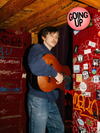Hannah Frances Makes Prog Rock for Tender Folkies
The Vermont singer-songwriter on her love of Yes, her brilliant new album, and the benefits of not going to music school

In the spring of 2022, the singer-songwriter Daniel Rossen posted on Instagram looking for a last-minute merch person to work his Philly show. Hannah Frances Pautler happened to be in town and saw the IG story a minute later. An inventive artist in her own regard, she jumped at the chance to chat up one of her favorite musicians. Everything went well, and at the end of the night, Rossen—a multi-instrumentalist who led ’00s indie rockers Grizzly Bear—gave her a vinyl copy of his solo record, You Belong There. With zero expectations, Pautler—who goes by Hannah Frances professionally and plays a striking mix of folk, jazz, and prog rock—handed Rossen a CD copy of her 2021 album, Bedrock. “It was corny but I remember being like, ‘I know you’re touring a lot, if you have a CD player,’” she recalls. A week or so later, Rossen messaged her on Instagram saying he listened to Bedrock on a long drive and really enjoyed it, drawing comparisons to ’70s psych-folk singer Linda Perhacs (a compliment, to be sure). “Even Daniel saying to me ‘good luck out there’ meant a lot because he’s so cynical about the music industry,” adds Frances, 28.
Back then, Hannah Frances was just starting to take herself seriously as a musician. 2022 changed everything: She left a relationship that made her feel small, moved to Chicago from NYC, traded her car for a van, and made a “figure-eight around the country” on her first tour. Towards the end of the year, Frances recorded her sixth album (and future breakthrough), Keeper of the Shepherd. She sent it to Rossen before it was even finished, hoping he might take on a production role. But Rossen was in the midst of scoring Past Lives with his old bandmate Chris Bear, and their emails tapered off. The timing wasn’t right, but Frances—who has a habit of recording music years before it sees the light of day—had faith that they’d collaborate. When Rossen congratulated her on Keeper of the Shepherd’s release last spring, she already had another, even more avant-garde LP in the works, and was curious of his thoughts.
That album, Nested in Tangles, arrives October 10 via Fire Talk Records, and includes Rossen playing a half-dozen instruments across two tracks. “I listened to so much Grizzly Bear in high school—they’re in my blood, so it makes sense that we would collaborate so easily together,” says Frances. There always was a touch of prog’s technicality tucked within Grizzly Bear’s baroque instrumentation and vocal harmonies, and clearly this sensibility hits home with Frances. “Yes is my favorite band,” she told me over Zoom from Delft, Netherlands earlier this month. When someone from her label frowned upon using the ’70s UK prog group Gentle Giant as a reference point for Nested in Tangles, Frances pushed back… three times. But let’s be clear: for Frances, prog is just one texture to be explored and contrasted. “All of the tender moments on the record are necessary because they help juxtapose the more angular parts and uncomfortable moments where you’re like, Whoa, that time signature is crazy.”





